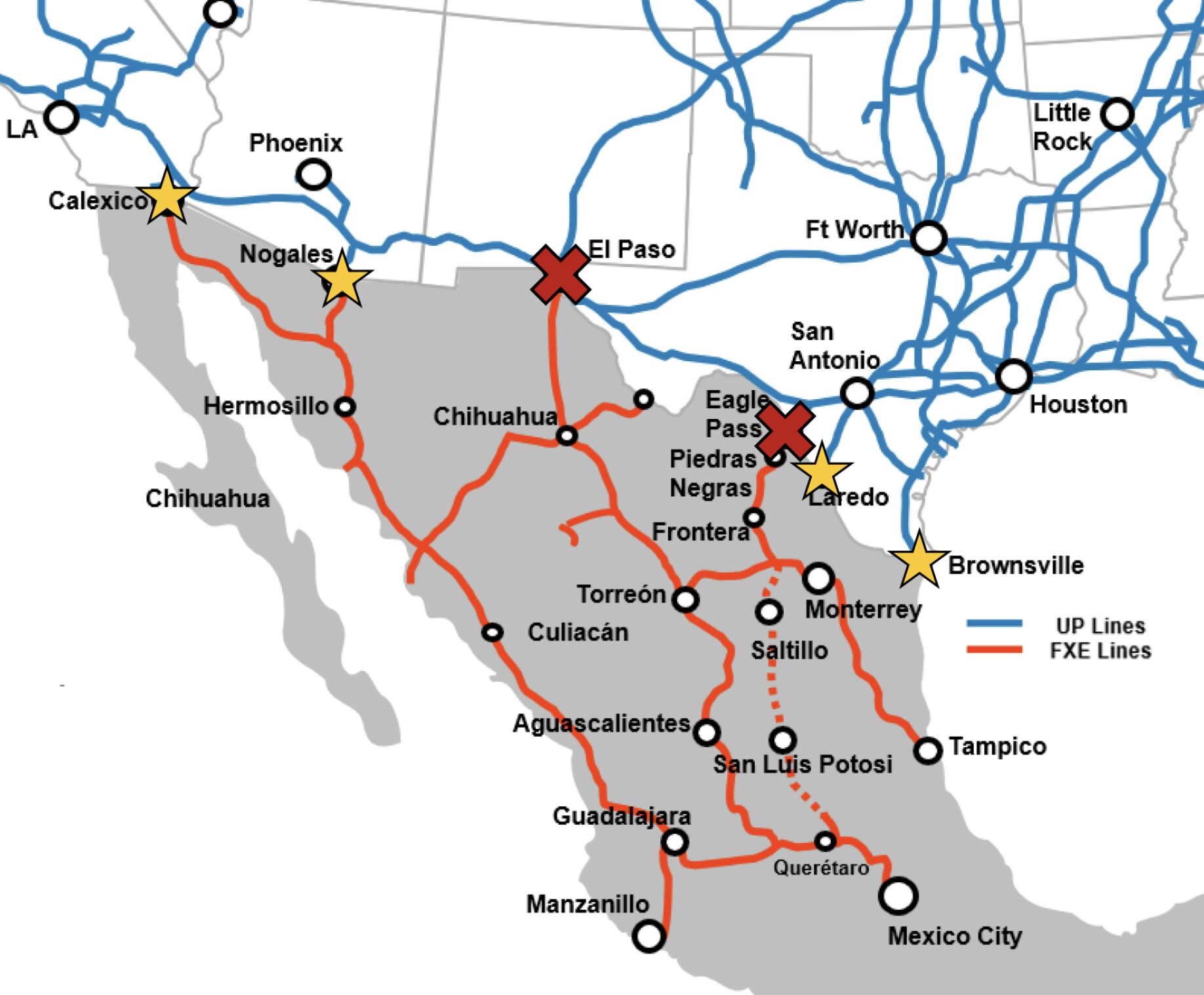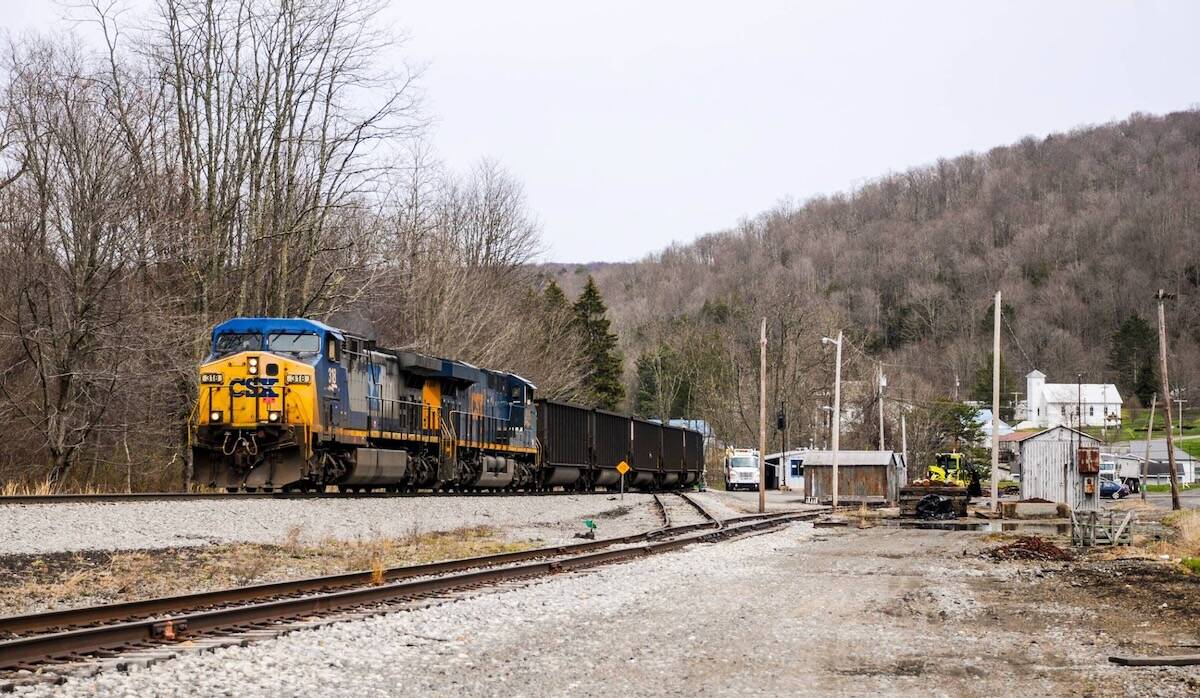
WASHINGTON — As the shutdown of the Eagle Pass and El Paso, Texas, rail gateways enters its third day, the U.S. Customs and Border Protection agency has given no indication of when it will allow freight traffic to resume.
Customs officials closed the gateways — the second and third busiest rail border crossings — at 8 a.m. on Monday, citing the need to divert personnel to assist the U.S. Border Patrol with taking migrants into custody.
Union Pacific and BNSF Railway interchange nearly two dozen trains per day with Ferromex via Eagle Pass and El Paso. The gateways handle roughly 45% of UP’s cross-border traffic.
The railroads, along with the Association of American Railroads, have asked the Biden Administration to reopen the border crossings immediately. UP estimates that each day the bridges remain closed it represents a $200 million hit to the economy.
The AAR notes that migrants are not using the rail crossings to enter the U.S. illegally, and that effective screening ensures that any people trying to cross the border are taken into custody.
“Union Pacific invests billions annually to protect our rail network, including technology and resources to secure U.S. border crossings. Very few migrants cross into the U.S. on trains. In fact, during this massive surge only five people have attempted to come into the U.S. on Union Pacific trains in the last five weeks,” railroad spokeswoman Robynn Tysver says. “UP Police and our employees work in partnership with U.S. Customs and Border Protection to ensure all trains are screened, using X-ray technology and visual inspections, and unauthorized people or contraband are apprehended.”
“Closing the rail gateways to move four or five CBP agents who staff the crossings at any one time to support other efforts related to the current crisis adds limited additional capacity, but results in tremendous economic hardship,” the AAR said today.
Groups representing shippers have also sought to have the border crossings reopened.
The National Feed and Grain Association and the North America Grain Export Association say that livestock feed supplies are running low as multiple grain trains are being held back from the border. “The critical nature of this issue is growing by the hour, particularly for those livestock feeders that may run short of feed,” the groups said.
Eagle Pass has become a growing gateway for intermodal traffic, including the Falcon Premium service that Canadian National, UP, and Ferromex launched in May.
“While acknowledging the ongoing border issues, it is imperative that the flow of freight remains unencumbered throughout these challenges. The reopening of these border crossings is vital to reinstating the essential flow of trade between the U.S. and Mexico,” says Joni Casey, CEO of the Intermodal Association of North America.
The American Chemistry Council says the closure of the gateways is already affecting chemical manufacturers, whose supply chains are heavily dependent on railroads. One company had 45 loaded cars waiting to move into Mexico and 62 empties waiting to cross back into the U.S. as of Dec. 19.
“These closures are likely to create wider backups, with implications for the entire U.S. railroad network,” the chemistry council says. “The fact that CBP previously closed the border only a few short months ago gives us greater concern that these measures will be part of an increasing trend.”
The Eagle Pass gateway was closed for four days in September amid a surge in migrant crossings. At the time, Ferromex halted northbound traffic as a safety measure after thousands of migrants hopped freight trains to the border and more people had gathered along its yards and main lines.
“Shutting down rail traffic through Eagle Pass and El Paso will inflict significant economic harm,” says Neil Bradley, chief policy officer at the U.S. Chamber of Commerce. “Halting the legal movement of commerce will do nothing to secure the border.”
UP says that every day that the border crossings are closed, it is forced to embargo customers’ goods on more than 60 trains, or nearly 4,500 rail cars, with an equivalent amount of traffic being held in Mexico.
Commodities being held include grain held in six Midwestern states, beer brewed in Mexico, auto parts and finished vehicles, consumer goods, and industrial shipments such as metals and cement.
The busiest U.S.-Mexico rail gateway, Canadian Pacific Kansas City’s bridge at Laredo, Texas, remains open.
Note: Updated at 12:33 p.m. Central with additional comment from UP.














Alex, don’t forget there is a slight difference between Illegal and legal as it should be but today that no longer seems to exist. Today illegal means full benefits and care immediately.
to whom in may concern: You want stronger border security, but then complain when the border is closed to traffic. You can’t have your cake and eat it too – either close the border crossings so nobody hops trains, or shut up about illegal border crossings because big business _must_ prevail.
Also, please remember if you live in North America, we are all descended from immigrants at one point or another. (Unless you’re 100% Native American or Eskimo, of course)
Even Eskimos and North American indigenous were immigrants across the Bering ice bridge. When it comes down to it we are all native Terrans.
Alex and John, both good points!
Look at the junctions still open – California, Arizona and two in Texas. Tell me how this isn’t punishment of Texas by the Biden administration. they are saying: “Hey, Texas – elect Democrats, and we’ll reopen those trade gates!”
Does Laredo bridge have capacity to handle more trains?
Thanks Biden. You are destroying this country.
So not the illegal immigrants now or when #45 was taking up space in the White House. Not the dismal arrest rate of the last administration either? Meanwhile the current administration has arrested 5 million + illegal immigrants since taking office compared to a whopping 1 million + in 4 years of lackluster leadership under a grifter.